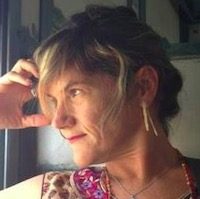
I walked down the aisle to the Nick Cave song, “Into my Arms.”
The first verse starts, “I don’t believe in an interventionist God, but I know darling, that you do.” It continues, “If I did, I would kneel down and ask him, not to intervene when it comes to you.”
It was a beautiful song for our wedding, and is still a beautiful sentiment.
I have been thinking a lot about this lately—this idea of an “interventionist God.” I know that it is the image of God that many of us were raised with. It is also the image that we call forth when we use petitionary prayer: calling upon God to intervene, or not to intervene, on our behalf; calling upon God to assist us, give us strength, help us find our wallet, help someone to heal.
It is the same image we conjure when we feel let down by God, or when we feel like we’ve asked for help and God hasn’t shown up. It is the image of a God who allows horrible things to happen to good people, who makes arbitrary decisions about people’s lives.
But this image of God gives me little solace.
In my own family, I think of my oldest nephew—my first glimpse of divine love—who had a near fatal car accident just a couple of weeks ago, breaking his spine in several places along with various other bones. I think to myself, “Oh, thank God he is alive.” And then, a few weeks later, I received a late-night phone call from my brother telling me his wife’s nephew, just 18 years old, was goofing around with friends—doing stupid teen stuff we all did—when he fell and sustained a massive head injury. He died just two days later.
Where was this God then?
I think of my beloved older sister and dearest friend, who is so full of life and gives so much to her community, to the world, and to her young son, and yet is dealing with an aggressive cancer that is robbing her of life force, freedom to move, to eat, to socialize. And I hear the question arise, as it did when I was a child, “How can this possibly be happening? How could God let this happen?”
It has been a long time since I believed in an interventionist God. And yet, even with my years of spiritual practice—a practice in which I have purposefully transformed my personal idea of God—it is this deeply ingrained image of the “all powerful, and yet devilishly capricious Master” that returns—even if just for the briefest of moments—in times of uncertainty, fear, loss, and doubt.
But I welcome this flash of my old image, as it invites me to recommit to my current one. In fact, when I think about the arbitrariness of who dies and who lives and how, who gets hurt and who gets helped, who suffers and how, and whether or not they deserve it, it leads me firmly to the exact opposite conclusion: there is no such thing as an interventionist God, and the randomness of suffering is to me the perfect evidence.
There is no “old man in the sky.”
There is no malevolent micromanager, picking and choosing who gets what in this life. Just like there is no benevolent spirit who will answer my prayers as I offer them.
I know this, because I have prayed for all kinds of things that never came about. Did that God just not like me? Not hear me? Did I not do it right? Was I not good enough? And when I was rewarded, what, exactly, did I do to deserve that?
Yet, when I reject this image of God, I don’t reject God—I redefine her.
When I was younger, I could never understand why people could have something terrible happen to them, and in that moment, “find God.” It seemed to me it would be the opposite. God has forsaken you, so why bother anymore?
I think I understand now, because it is in those moments that the image of God must be redefined. It would be untenable to live with the idea that the “old” God had let this thing happen, so that image must be rejected in favor of something new, something that brings solace and inspiration. And for many people, this something would never be named God, but instead, simply a feeling of vastness, a feeling of connectedness, a feeling of some wondrous, mysterious, unifying force that pulses behind the universe.
I am reminded of an image someone shared with me, years ago, of a Persian rug. On the one side, we see a beautiful, intricate, tightly-woven design. On the other, a mass of tiny knots. If we saw only the the knotty side, we might not think of it as beautiful or valuable. In fact, it might seem chaotic, undesirable. However, when we take the time to look at the woven side, we understand that what we saw as random is actually part of a greater whole.
I remember when I first read Harold Kushner’s book, When Bad Things Happen to Good People. It was many years ago, and I was teaching yoga regularly. I remember talking to my class about Rabbi Kushner’s idea of God as the inspiration all around us, as that presence that could lift us up out of despair, that could be seen in the early morning sun, in the canopy of the trees, in the night sky, in a silent moment with a loved one.
And I asked them, if we had a friend who we relied on for solace and comfort when we needed it most, wouldn’t we take time to cultivate a relationship with that person? In the same way, if we want to experience the consolation of “God presence,” maybe we should consider cultivating that relationship as well. Maybe we should spend more time looking at both sides of that rug.
Rabbi Kushner says:
“God is the light shining in the midst of darkness, not to deny that there is darkness in the world but to reassure us that we do not have to be afraid of the darkness because darkness will always yield to light.”
We have to take the time to recognize that light—to see it all around us—so we know where and how to find it when darkness falls, who to turn to, how to take care of ourselves, how to turn inward to find God then and there.
French theologian Pierre Teilhard de Chardin says, similarly:
“In the final analysis, the questions of why bad things happen to good people transmutes itself into some very different questions, no longer asking why something happened, but asking how we will respond, what we intend to do now that it happened.”
I believe that my own capacity to respond is inextricably related to my sense of God presence. Clearly, not the interventionist God, but God as love. God as nature. God as quietude. God as space.
And just as I admonished my students all those years ago, I am dedicated to cultivating that sense of God presence in my everyday life—that sense of real relationship—so it is not a “friend” I am suddenly reaching out to or a friend with whom I’ve spent little time or given little effort to or only turn to in difficult times.
I tend to this relationship when I fully acknowledge moments of grace, moments of pure joy, moments of stillness, moments of deep understanding without really knowing why.
I connect with this image when I remember to look at both sides of that Persian rug.
I foster this presence when I feel the open space in my heart, when I sit and invite a sensation of divine fullness, when I float in the ocean and feel my own tininess.
“I don’t believe in an interventionist God…
But I believe in love
And I know that you do too
And I believe in some kind of path
That we can walk down, me and you.”
To me, God is the grace in the space, and that space is all around me and within me. This is the God that can lift me up, and with this God there is no one to point to, for how do you point to love? How do you point to space?
Look no further than your own heart. There you will find the pathway, there you will find the solace. There you will find God—a love so powerful that it has the capacity to guide us home, and keep our hearts reaching toward one another.
We are all in this together.
~
~
Author: Molly Lannon Kenny
Image: Ioana Casapu/Unsplash
Editor: Nicole Cameron
Copy Editor: Leah Sugerman
Social Editor: Yoli Ramazzina








Read 10 comments and reply